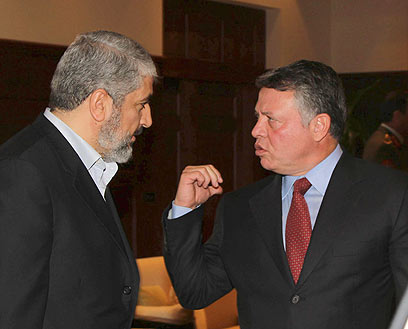Rateb Amro, retired Jordanian colonel says PA’s bid at UN is ‘unreasonable’ but relations between Israel and Jordan are still good. Amaro warns however that not one Arab country will allow Israel or the US to attack Iran
Roi Kais
“When I was in the army, I fought against Israelis but those who suffered from war the most, were those who were convinced we must work towards peace. I do my job and I don’t care what others say,” Rateb Amro, a retired colonel in the Jordanian army told Ynet at the annual conference on counter terrorism held in Herzliya.
Despite it not being a popular time for Arab officials to meet with Israelis and discuss matters of terror and regional tensions, Amro decided to do his job.

King Abdullah and Hamas leader last year – Photo: Reuters
During the past few years, Amaro has headed the Horizon Center for Studies and Research in Amman, and in his lecture at the Herzliya conference, Amaro spoke about the consequences of the Arab Spring on the Palestinians.
Amro believes that the PA’s bid for UN recognition is not the right path to take. “They can turn to the UN, but I believe that they must solve their issues and come to a permanent agreement with the Israelis and only then should they ask the UN to recognize the Palestinian Authority as a non-member observer state.”
“The Palestinians are doing the exact opposite. Will they declare a Palestinian state with just 22% of the territory of historical Palestine? What about the border with Jordan? What about the border with Israel? What about Jerusalem?” Amro asked.
The Palestinian matter also affects Israel’s relationship with Jordan. According to Amro, this is the reason why Netanyahu and King Abdullah have yet to meet on the matter. “We believe that Netanyahu is hesitant to solve the Palestinian issue and sit down with Palestinian President Mahmoud Abbas to go over the problems,” he said.
Asked whether diplomatic relations between Israeli and Jordanian leaders stil exist, Amro said: “I believe that there is no tension between the two countries. We have a good relationship.”
Regarding the tightening relations between Jordanian leadership and Hamas, Amro emphasized that the tight relations will not lead to the reopening of Hamas headquarters in Amman. “We support Abbas and believe that only he is accepted by the Palestinians.”
Asked about Israel’s possible strike on Iran’s nuclear facilities, Amro said: “As a military man, I believe it would be a grave mistake if Netanyahu decides to attack Iran. I fear that if Israel or the US decides to strike Iran, the whole region will pay the price.”
“No one in the Arab world is satisfied with Iran’s nuclear program. Speaking truthfully, not one of the Arab countries will allow Israel or the US to attack Iran. You can call Iran an enemy as much as you want, but the bottom line is that Iran is an Islamic country and no one will allow you (Israel and the US) to attack it,” Amro said.
“Sometimes I believe Netanyahu uses Iran as propaganda in an effort to solve the issues within Israel. No one knows what will happen if Israel decides to strike Iran. That is why I hope Israel changes its mind,” he added.
Regarding the subject of developing a similar nuclear program to Iran’s in Jordan, in an effort to balance the power in the region, Amro said that “Jordan isn’t even thinking of nuclear weapons. We live in peace. Why do we need nuclear weapons? We have one of the strongest armies in the region. Who would we use the weapon against?”
Despite Jordan’s wish to solve the Iranian issue without using military force, Amro admits that Jordan has a problem with Iran’s foothold in the Middle East. He explains this problem when discussing the situation in the territories: “Abbas must deal with many challenges as a result of Iranian intervention. He can’t even get Hamas to sit down at the same table with him.”
Regarding the possibility of Syrian chemical stockpiles reaching Hezbollah militants, Amro claimed this scenario would not happen in the near future. “It would not be simple for Hezbollah to use the chemical weapons. Even if they do manage to get there hands on it, they would not be able to use it against anyone, not even Israel.”
He explains his argument by saying that chemical weapons depend on wind directions. Therefore, it would be difficult to control the weapon. “In addition,” he says “if Hezbollah or Syria start using chemical weapons, the whole region will burn. No one will agree to it or keep silent.”
View original Ynet publication at: http://www.ynetnews.com/articles/0,7340,L-4281553,00.html






 Israeli New Shekel Exchange Rate
Israeli New Shekel Exchange Rate